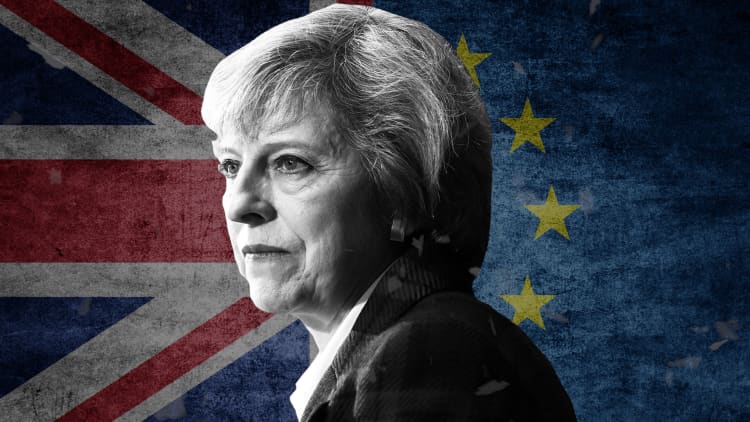As British MPs prepare to vote on Prime Minister Theresa May's plan for Britain's departure from the European Union, every reliable tally of expected voting choices among lawmakers indicate defeat for the premier and her government.
When the Brexit proposal was last scheduled for a vote in mid-December, more than 100 members of May's Conservative Party had publicly stated they could not offer their support. Add to that the expected defiance from a vast majority of opposition Labour, Liberal Democrat and Scottish National Party lawmakers, as well as from the few key seats held by the government's Northern Irish partner the Democratic Unionist Party (DUP), and it was little surprise that May postponed the December vote in the face of such a major loss.
Now she tries again, and ahead of tonight's vote, hundreds of British political supporters on both sides of the Brexit divide have lined up alongside the Westminster Parliament's northern perimeter.
Those on foot wave flags and banners, shout slogans, clang bells and bang enormous drums. Trucks decorated with political slogans drive back and forth in front of the banks of television studios and camera positions, while passing cars honk support for one side or another. According to a non-scientific observation the split between pro-Europe and pro-Brexit supporters appears quite evenly matched, in line with the close 2016 referendum result.
But more than a month after May's postponement, the arithmetic inside the Palace of Westminster doesn't appear to have changed.
Attorney General Geoffrey Cox — the government's most senior lawyer — acknowledged to the House of Commons Tuesday afternoon that none of the fundamentals of the EU withdrawal legislation that might have encouraged lawmakers to switch their vote have actually changed.
Just hours before the expected vote, Cox admitted to the DUP's Westminster leader that despite earlier government assurances about discussions with top European officials, the government has failed to alter any legally binding aspect of the Irish "backstop" contained in the Withdrawal Agreement negotiated with Europe. This backstop provision — designed to avoid a hard border on the island of Ireland at all costs — would place the entire U.K. into a de facto EU customs union, unless and until a trade deal is struck with Europe that can permanently avoid a hard border.
Both the U.K. and EU insist that this limbo status would only ever be temporary, as it would be in neither side's interest. Indeed EU Council President Donald Tusk and European Commission President Jean-Claude Juncker published letters Monday to May designed to reiterate this point.
But although this backstop scenario does offer Britain the benefit of continued "frictionless trade," until both parties can hash out an agreement about Ireland's border it would also force the U.K. to follow rules created in Brussels. And crucially it has been the prospect of this loss of sovereignty, however temporary, that has angered many Conservative MPs, and put May's deal in such doubt.
There are several opposition Labour lawmakers who have said they will back the prime minister on Tuesday evening, along with a handful of Conservative MPs. But based on public statements counted up by British broadcasters Sky and the BBC, that shift in sentiment is not nearly significant enough to alter May's difficult reality.
As for what happens next, a clutch of pro-EU campaign groups have released fresh research. Based on polls of more than 6,700 potential voters across the U.K., the activist organizations Best of Britain and Hate Not Hope found that a majority of U.K. voters are now in favor of a second referendum on EU membership, in the event that the House of Commons votes down May's proposal.
The research is based on polling that was conducted in mid December and early January by YouGov, and for the first time ever it found in each region of Britain now favors a majority. May has repeatedly and explicitly ruled out a second referendum. She has warned that a defeat tonight could be "catastrophic" and has spent the past few days telling members of her own party that a loss would increase the possibility that the U.K. does not leave Europe at all. The hypothetical referendum offered by the YouGov pollsters included three options; to remain in Europe, to leave without a deal or to leave under the terms May has negotiated already.
May has insisted this week that government is the "servant of the people," not of Parliament. But she has also made it very clear that she wants Parliament to approval her deal, and says she has no plans of putting it to a people's vote at some indeterminate point in the future.
WATCH:


